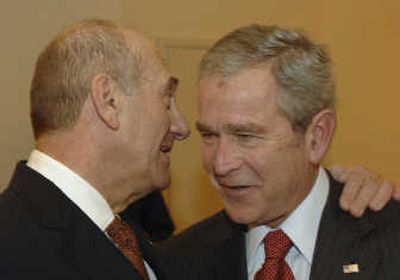Bush tells Israel to end ‘occupation’

RAMALLAH, West Bank – After a day of zipping through Israeli checkpoints, talking with Palestinian officials and visiting the birthplace of Jesus, President Bush bluntly called on Israel to “end … the occupation” of the West Bank and help pave the way for creating an independent Palestinian state.
The statement Thursday at Jerusalem’s King David Hotel came after Bush sought to reassure Palestinian leaders that he would serve as a fair mediator on a day when he became the first sitting U.S. leader to visit the de facto Palestinian White House in Ramallah.
“There should be an end to the occupation that began in 1967,” he said. “The agreement must establish Palestine as a homeland for the Palestinian people, just as Israel is a homeland for the Jewish people.”
By challenging Israelis with such charged language in their own country, the president appeared to be signaling Palestinians that he’s serious about prodding both sides to secure a peace deal this year.
Though Bush has said he would serve mostly as an arbiter between Israel and the Palestinians, he suggested “painful compromises” that both sides should consider.
He reaffirmed his belief that Israel should be allowed to absorb major Jewish settlements illegally built in the West Bank over the past 40 years. But he called on Israel to halt settlement expansion and immediately dismantle scores of smaller, renegade West Bank outposts.
He also floated a possible compromise on one of the most sacrosanct issues for Palestinians: the right of 4.4 million Palestinian refugees scattered around the globe to return to family homes in what’s now Israel. Bush suggested instead that refugees receive monetary compensation, an idea that’s likely to anger many Palestinian refugees who have held on to the rusting keys to houses in Jaffa and other Israeli cities.
Bush’s speech gave Israeli and Palestinian negotiators some new guideposts to direct their talks. But leaders on both sides harbor strong private doubts that the president’s diplomacy can produce a deal before he leaves office next January.
Arabs and Israelis remain far apart not only on the future of Palestinian refugees but also on the future of Jerusalem, which both claim as their capital, the location of the border between Israel and a Palestinian state, the rights to water in the arid region and other issues.
“He’s trying to give the Palestinians a feeling of evenhandedness,” said Hillel Frisch, a senior research fellow at Israel’s Begin-Sadat Center for Strategic Studies. “But I doubt it is going to achieve peace, because I don’t think peace is achievable.”
With peace talks limping along and skepticism about Bush’s intentions running high, the president has spent the past two days lauding, cajoling and prodding Israeli and Palestinian leaders.
He vowed to put pressure on both sides and “be a pain if I need to be a pain – which in some people’s minds isn’t all that hard.”
But because of Bush’s staunch support for Israel, many Palestinians consider him a biased mediator and are wary of any peace deal he may propose.
Bush, Palestinian Authority President Mahmoud Abbas and Israeli Prime Minister Ehud Olmert kicked off talks in November at a summit in Annapolis, Md. Since then, the negotiations have foundered on disagreements over continued Israeli construction in Arab East Jerusalem and relentless rocket fire by Palestinian militants in Gaza, who target towns in southern Israel.
Bush dismissed naysayers Thursday.
“I believe it’s possible. Not only possible, I believe it’s going to happen, that there will be a signed peace treaty by the time I leave office,” he said.